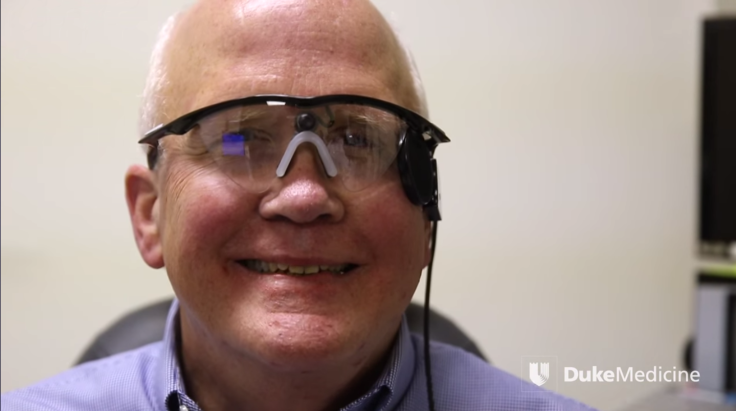Blinded For 33 Years, Larry Hester Gets A Chance To See Again With Bionic Eye

Larry Hester lost his sight when he was in his early 30s due to a degenerative disorder called retinitis pigmentosa. It left him living in virtual darkness, unable to tell the difference between where a door started and the wall ended, for nearly 33 years.
The tire salesman from North Carolina, however, recently got a new chance at sight, because he was provided with a new bionic eye gadget known as the Argus II. In a video made at Duke University Eye Center, Hester is shown seeing through the bionic eye for the very first time. When doctors turn on the device, Hester is able to see light again, which brings an ecstatic and emotional smile to his face while his wife runs over to kiss him in glee.
The Argus II Retinal Prosthesis System was approved by the FDA in early 2013, and has since been worked on even more to improve its visual system. It’s the first implanted device to treat people with retinitis pigmentosa, which can affect people as early as their teens and twenties, and has no cure. The Argus II is made of a small electronic device that’s implanted in the eye, a video camera in a pair of glasses, and a video processing unit carried by the patient. The video camera in the glasses stores images which become an electrical signal; they're then sent to the implant, which stimulates the retina.
66-year-old Fran Fulton, another patient with retinitis pigmentosa, received the Argus II earlier this year. Fulton also expressed joy when the gadget allowed her to differentiate between light and dark. She described being able to notice the door and walk straight in without having to use her cane. “Every day it’s very exciting, and never in my lifetime did I ever think something like this could happen,” she told the BBC.
Even though the users of Argus II can only differentiate between light and shadows, it’s a major step forward for them; their future opens up right before their eyes, quite literally. “It’s so basic,” Hester said in the video, describing the simplicity of his vision. “The light is so basic and probably wouldn’t have significance to anybody else. But to me it’s meaning I can see light. And we can go from here.”
Published by Medicaldaily.com



























